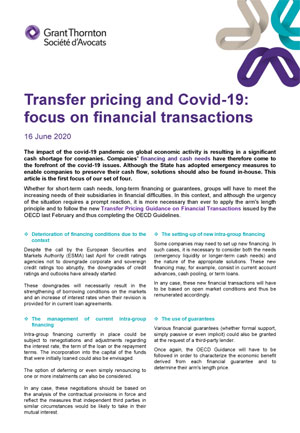-
Tax Policy Management
Tax Policy Management
-
Growth Management
Growth Management
-
Tax audit and litigation
Tax audit and litigation

-
Definition of a strategic and secure transfer pricing structure
Definition of a strategic and secure transfer pricing structure
-
Assistance in the development of international activities and operational reorganisations – “Business restructuring”
Assistance in the development of international activities and operational reorganisations – “Business restructuring”
-
Defense of practices and assistance in the context of tax audits and their follow-up from a litigation viewpoint
Defense of practices and assistance in the context of tax audits and their follow-up from a litigation viewpoint
-
Annual declaration and documentation obligations
Annual declaration and documentation obligations

-
Domestic and international VAT applicable to your company's flow
Domestic and international VAT applicable to your company's flow
-
Banking and financial VAT, VAT in the insurance sector
Banking and financial VAT, VAT in the insurance sector
-
VAT related to real estate registration fees
VAT related to real estate registration fees
-
VAT in the public and non-profit / association sector
VAT in the public and non-profit / association sector
-
Tax audit, tax litigation and relations with the Tax authorities
Tax audit, tax litigation and relations with the Tax authorities
-
Applicable rules for invoicing
Applicable rules for invoicing
-
Customs issues related to your company's international flows
Customs issues related to your company's international flows
-
French VAT registration and compliance obligations
French VAT registration and compliance obligations
-
Payroll tax
Payroll tax
-
Other indirect taxation
Other indirect taxation

-
Company transfer diagnosis
Company transfer diagnosis

-
Distribution strategy : Implementing and structuring
Distribution strategy : Implementing and structuring
-
Distribution activities digitalisation
Distribution activities digitalisation
-
Relations between suppliers and distributors
Relations between suppliers and distributors
-
Contractual policy : etablishing and structuring
Contractual policy : etablishing and structuring
-
Controls and litigation regarding payment terms
Controls and litigation regarding payment terms
-
Organising and securing commercial relations with consumers
Organising and securing commercial relations with consumers
-
Data protection - GDPR
Data protection - GDPR
-
Commercial Leases
Support in the management and contract management of commercial leases.

-
Traditional Services offered
Traditional Services offered
-
Health at work and quality of life at work
Health at work and quality of life at work
-
HR Management Audit
HR Management Audit
-
HR Engineering and People Change
Implementing managerial solutions in line with the company's strategic challenges
-
Management of HR compliance and internal investigations (harassment, discrimination, and whistleblowing)
Management of HR compliance and internal investigations (harassment, discrimination, and whistleblowing)

-
Advice on legal structuring
Advice on legal structuring
-
Day to day company management
Day to day company management
-
Companies reorganisation
Companies reorganisation
-
Mergers & Acquisitions - Private Equity
Mergers & Acquisitions - Private Equity
-
Changes in shareholder structure - Securities issue
Changes in shareholder structure - Securities issue
-
Governance and legal risks management
Governance and legal risks management

-
Development of an international mobility policy
Development of an international mobility policy
-
Coordination of reporting obligations for employees in a mobility situation
Coordination of reporting obligations for employees in a mobility situation
-
Advice on social security
Advice on social security
-
Assistance in labour law
Assistance in labour law

-
Management and protection of your portfolio of property rights
We put the most appropriate protection policy in place for our clients’ intellectual property rights.
-
Securing your projects: advisory and drafting of agreement services
We advise you on the feasibility of your project and the securing of your intellectual property and IT rights.
-
Enforcement of your rights: pre-litigation and litigation
Enforcement of your rights: detection of infringement, pre-litigation and litigation

The impact of the covid-19 pandemic on global economic activity is resulting in a significant cash shortage for companies. Companies’ financing and cash needs have therefore come to the forefront of the covid-19 issues. Although the State has adopted emergency measures to enable companies to preserve their cash flow, solutions should also be found in-house. This article is the first focus of our set of four.
Whether for short-term cash needs, long-term financing or guarantees, groups will have to meet the increasing needs of their subsidiaries in financial difficulties. In this context, and although the urgency of the situation requires a prompt reaction, it is more necessary than ever to apply the arm's length principle and to follow the new Transfer Pricing Guidance on Financial Transactions issued by the OECD last February and thus completing the OECD Guidelines.
Deterioration of financing conditions due to the context
Despite the call by the European Securities and Markets Authority (ESMA) last April for credit ratings agencies not to downgrade corporate and sovereign credit ratings too abruptly, the downgrades of credit ratings and outlooks have already started.
These downgrades will necessarily result in the strengthening of borrowing conditions on the markets and an increase of interest rates when their revision is provided for in current loan agreements.
The management of current intra-group financing
Intra-group financing currently in place could be subject to renegotiations and adjustments regarding the interest rate, the term of the loan or the repayment terms. The incorporation into the capital of the funds that were initially loaned could also be envisaged.
The option of deferring or even simply renouncing to one or more instalments can also be considered.
In any case, these negotiations should be based on the analysis of the contractual provisions in force and reflect the measures that independent third parties in similar circumstances would be likely to take in their mutual interest.
The setting-up of new intra-group financing
Some companies may need to set up new financing. In such cases, it is necessary to consider both the needs (emergency liquidity or longer-term cash needs) and the nature of the appropriate solutions. These new financing may, for example, consist in current account advances, cash pooling, or term loans.
In any case, these new financial transactions will have to be based on open market conditions and thus be remunerated accordingly.
The use of guarantees
Various financial guarantees (whether formal support, simply passive or even implicit) could also be granted at the request of a third-party lender.
Once again, the OECD guidance will have to be followed in order to characterize the economic benefit derived from each financial guarantee and to determine their arm's length price.
How to secure your intra-group financial transactions?
Financial transactions were already attracting special attention from the French Tax authorities, due to a rich jurisprudential evolution. Given the considerable financial stakes that tax audits represent, this attention should not decrease in the coming years.
It is therefore crucial that the teams in charge of treasury and tax coordinate and work together in order to secure intra-group financial transactions and anticipate upcoming tax audits. With this in mind, a particular vigilance must be exercised on the following issues:
- Precise delineation of the financial transaction (what the needs are and how to meet them) in order to prevent any risk of requalification, including capital requalification;
- Compliance of the use of funds with selecting borrowing terms and conditions;
- The performance of precise and adequate functional analyses;
- The preparation of a documentation including, in particular, the appropriate economic analyses;
- Other tax consequences related to financial transactions (in particular with regard to the deductibility of financial charges and withholding tax).
Authors: Pascal Luquet, Attorney-at-law, Partner, Mickaël Duquenne, Tax advisor, Nadia Boudaoud, Attorney-at-Law.
















